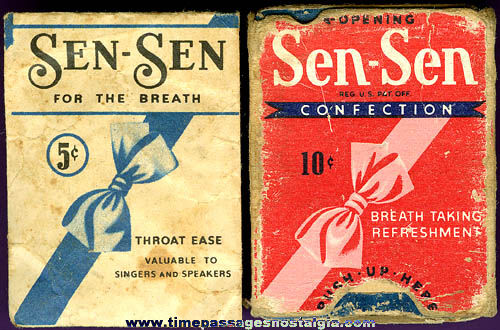Did
you know that clear back in the 1870s, shipping
companies lobbied Jules Verne to include them by name in his novel Around the World in 80 Days ? Even in the
nineteenth century, corporations saw the potential for product placement
advertising in literature.
I stumbled upon the following list on Wikipedia the other day. It’s
a list of literary references for the old-fashioned breath freshener Sen-Sen,
which you can still find today, I believe. I’d bet that maybe only Coca-Cola
could generate a longer list than this:
- Michael
Chabon references them in his novel The
Amazing Adventures of Kavalier and Clay.
- Toni
Morrison references them in her novel The
Bluest Eye.
- Zora
Neale Hurston references them in her novel Their
Eyes Were Watching God.
- John
D. Fitzgerald references them in his novel The
Great Brain.
- Betty
Smith references them in her novel A Tree
Grows in Brooklyn.
- Robert
Asprin has a character called "The Sen Sen Ante Kid" in his novel Little Myth Marker. The character plays
Dragon Poker and always starts the game by adding a Sen Sen to the ante.
- Stephen
King references them in his novel 11/22/63
as well as in his novella The Library Policeman.
- Philip
Roth references them in his novel I
Married A Communist.
- Ray
Bradbury references them in his novel Death
is a Lonely Business.
- Robert
Penn Warren references a character named Sen-Sen Puckett "who chewed
Sen-Sen to keep his breath sweet" in his novel All The King's Men.
- Phillip
K. Dick references them in his novel Ubik.
- W.
Somerset Maugham mentions them in his novel Of
Human Bondage.
- John
Steinbeck references them in the novel The
Wayward Bus.
- Thomas
Harris references them in the novel The
Silence of the Lambs. "... she felt the ache of his whole
yellow-smiling Sen-Sen lonesome life..."
- Christopher
Bram references them in his 1988 novel Hold
Tight.
- Chuck
Palahniuk references them in his 2011 novel Damned.
- Margaret
Laurence references them in her novel A Bird in the House.
- Lanford
Wilson references them in his play Talley's
Folly.
- They
are also referenced in Tennessee Williams' A
Streetcar Named Desire.
- They
are referred to in the song "Ya got trouble" in the movie and play
'The Music Man'


